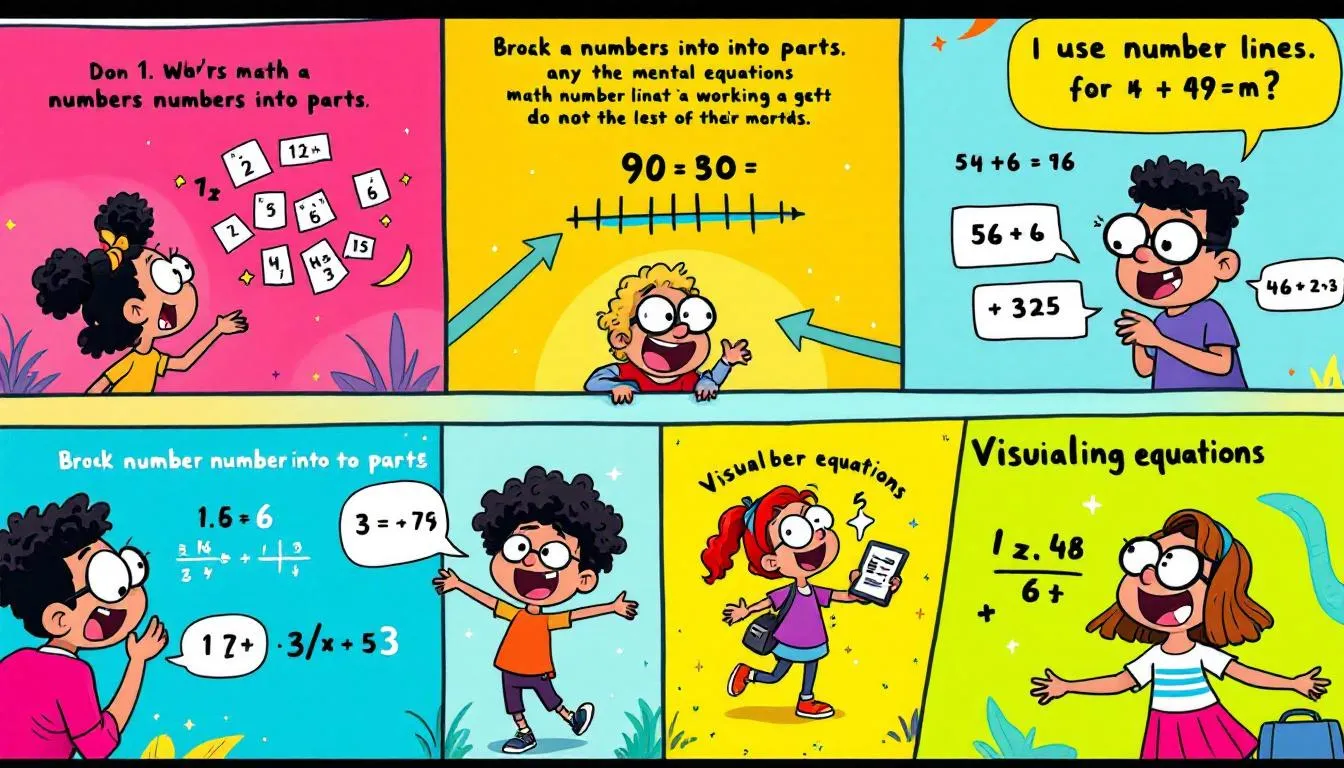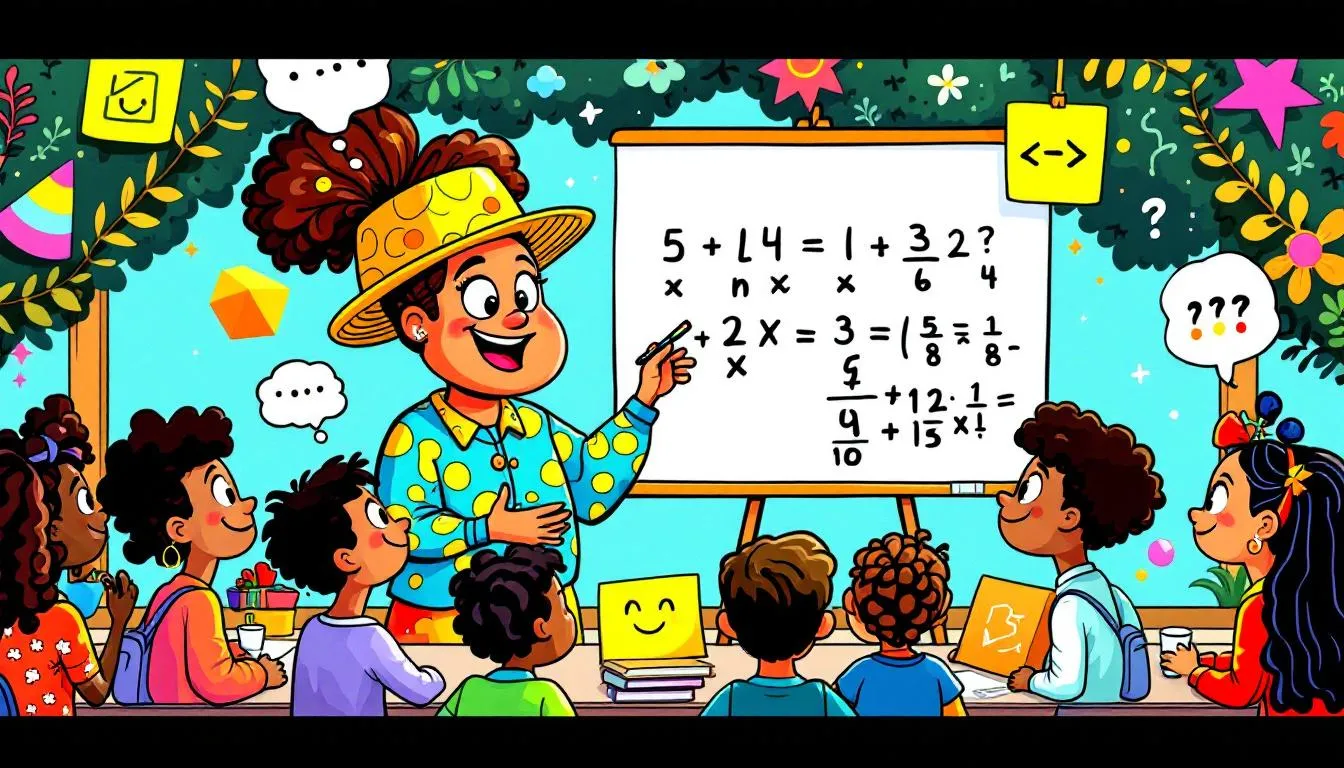What Is Mental Math? Essential Skills for Quick Calculations
Mental math is the ability to quickly and accurately perform calculations in your head. It’s a vital skill that enhances number sense and overall mathematical understanding. Wukong Education will delve into “what is mental math,” its benefits, and ways to improve this ability.
Key Takeaways
- Mental math involves performing calculations mentally without external tools and relies on strong working memory and number sense for accuracy and agility.
- Core components of mental math include proficiency in basic arithmetic operations, understanding number relationships, and effective memory functions.
- Regular practice and techniques such as breaking down problems and recognizing patterns enhance mental math skills, promote confidence, and improve problem-solving abilities.
1.Understanding Mental Math

Mental math is the ability to perform calculations in one’s head without relying on external tools like calculators or paper. This skill is not just about quick arithmetic; it’s about enhancing your overall mathematical understanding and agility. Successful mental math requires a strong working memory, familiarity with addition facts, and a solid grasp of times tables. These elements serve as the foundation for performing mental calculations efficiently and accurately.
Moreover, mental math is a skill that can be developed and improved with practice, with no upper limit to one’s potential ability and the possibilities it offers. It enhances number sense, allowing individuals to get answers faster and facilitating a better understanding of complex math concepts and knowledge.
Discovering the maths whiz in every child,
that’s what we do.
Suitable for students worldwide, from grades 1 to 12.
Get started free!Mental math is not just an academic skill; it’s a life lesson that can significantly improve performance for a student in school and everyday activities.
2.Core Components of Mental Math
The cornerstone of mental math lies in a concept known as number sense, which encompasses the understanding of numbers, their relationships, and practical applications. Number sense is crucial for developing strong mathematical skills, as it allows individuals to grasp the significance of each digit in a number, especially when dealing with place value. This understanding forms the bedrock upon which more complex mental calculations are built.
Proficiency in the four operations—addition, subtraction, multiplication, and division—is essential for effective mental math. These four operations are the building blocks of all mathematical calculations and are necessary for solving a wide range of math problems. Mastery of these operations enables individuals to mentally calculate large numbers and handle complex mathematical tasks with ease.
Enhancing memory functions, particularly working memory, is also a critical component of mental math. Strong working memory allows individuals to hold and manipulate several digits in their minds, making it possible to perform calculations swiftly and accurately without written aids. Together, these core components work in harmony to develop robust mental math skills.

3.Techniques to Improve Mental Math
Improving mental math involves a mix of effective techniques and consistent practice. Three key strategies can significantly enhance mental math skills: breaking down problems, using patterns and relationships, and regular practice.
These techniques, when combined, provide a comprehensive approach to mastering mental strategies and mental calculations.
Breaking Down Problems
Using simple strategies like breaking down problems into manageable parts can make mental calculations less intimidating. For example, instead of trying to calculate 27 x 4 directly, you can break it down into (20 x 4) + (7 x 4), which simplifies the process. This method not only increases speed but also builds confidence in solving larger problems.
Breaking down calculations helps reduce anxiety and improves overall accuracy. By simplifying large numbers into smaller divisions, students can approach math problems with greater ease and clarity. This technique is particularly useful for tackling complex mathematical tasks and enhancing overall mathematical understanding, allowing students to count on their skills effectively. Additionally, this method can help students achieve a higher grade in their math assessments.
Using Patterns and Relationships
Understanding patterns in number relationships enhances mental calculation abilities, making it easier to solve problems. Recognize these patterns allows individuals to apply rules and techniques more effectively, leading to faster and more accurate mental calculations.
Regular Practice
Regular practice is essential for mastering mental math skills. Consistent practice helps maintain familiarity with mathematical facts and improves overall number sense. Incorporating mental math exercises into daily routines encourages students to tackle simple equations regularly, building proficiency and confidence in their abilities.
Incorporating regular mental math exercises into daily routines is crucial for long-term success in mathematics. By practicing mental math regularly, students can significantly improve their speed and accuracy in mathematical tasks. This consistent practice not only enhances mathematical proficiency but also builds confidence in one’s abilities.
4.Mental Math in Primary School Education

Foundational mathematical number concepts in primary school include counting, addition facts, and basic operations that prepare students for future learning. These fundamental skills are crucial for developing number sense and transitioning to more advanced mental math strategies. Introducing fundamental addition and subtraction concepts early on helps children excel in mental math, allowing them to quickly solve simple equations and master math facts.
Using manipulatives and visuals is essential for primary school students to understand foundational math concepts. Visual aids, such as number lines, help students visualize and understand the operations of addition and subtraction. These tools enhance their ability to grasp complex mathematical concepts and develop strong mental math skills.
Number lines and physical objects can effectively illustrate mathematical concepts to children, enhancing their understanding of addition and subtraction. These visual aids not only make learning enjoyable but also reinforce mathematical skills through engaging activities. By building a strong foundation in primary school, students are better equipped to handle more complex mathematical tasks in the future, benefiting each child.
5.Teaching Mental Math Strategies

Incorporating games into mental math lessons not only makes learning enjoyable but also reinforces mathematical skills through engaging activities. Games provide a fun and interactive way for students to practice mental math, making it easier for them to grasp complex concepts and develop strong mathematical skills.
Using a whiteboard and a pencil for solving equations can provide a visual and interactive way to practice mental math. This method allows children to work through problems creatively and enhances their understanding of mathematical concepts. Offering small rewards for accomplishments in mental math can motivate children and reinforce their progress, enhancing their confidence in their abilities.
Teaching mental math strategies involves using a variety of techniques to engage students and make learning enjoyable. By incorporating games, visual aids, and rewards into lessons, teachers can teach mental math in a positive learning environment that encourages students to practice mental math regularly.
Summary
In summary, mental math is a valuable skill that enhances mathematical understanding and proficiency. By developing strong working memory, mastering addition facts and times tables, and practicing regularly, individuals can significantly improve their mental math skills. Techniques such as breaking down problems, recognizing patterns, and using visual aids can simplify complex calculations and build confidence in one’s abilities. If your child is working toward mental math success, WuKong Math online classes offer targeted training that builds both speed and accuracy
Incorporating mental math into daily routines and primary school education is crucial for long-term success in mathematics. By overcoming common challenges and developing reliable mental math strategies, students can enhance their problem-solving skills and excel in various aspects of life. Embrace the power of mental math and unlock the full potential of your brain.
Frequently Asked Questions
What is mental math?
Mental math refers to the ability to perform calculations mentally without relying on calculators or written methods. This skill enhances your numerical intuition and comprehension of mathematical concepts.
How can I improve my mental math skills?
To improve your mental math skills, practice regularly, break down problems into manageable parts, and recognize numerical patterns. Consistent application of these strategies will significantly enhance your abilities.
Why is mental math important in primary school education?
Mental math is crucial in primary school education as it fosters foundational math skills like addition and basic operations, aiding understanding and preparing students for more complex tasks. This skillset enhances cognitive development and confidence in handling mathematical concepts.
What are some common challenges in mental math?
Common challenges in mental math include the inability to visualize calculations and the difficulty of retaining multiple digits in memory. To address these issues, it is essential to develop effective mental strategies and articulate your thought processes clearly.
How can teachers make mental math lessons more engaging?
Incorporating games, utilizing visual aids like whiteboards, and providing small rewards can significantly enhance the engagement of mental math lessons. These strategies foster a positive learning environment and motivate students to practice regularly.
Learn authentic Chinese from those who live and breathe the culture.
Specially tailored for kids aged 3-18 around the world!
Get started free!
Graduated from Columbia University in the United States and has rich practical experience in mathematics competitions’ teaching, including Math Kangaroo, AMC… He teaches students the ways to flexible thinking and quick thinking in sloving math questions, and he is good at inspiring and guiding students to think about mathematical problems and find solutions.

























![Iowa Assessment Test: Practice Tests Questions & Tips [2025 Updated] Iowa Assessment Test: Practice Tests Questions & Tips [2025 Updated]](https://wp-more.wukongedu.net/blog/wp-content/uploads/2023/12/image-24-520x293.jpeg)


Comments0
Comments